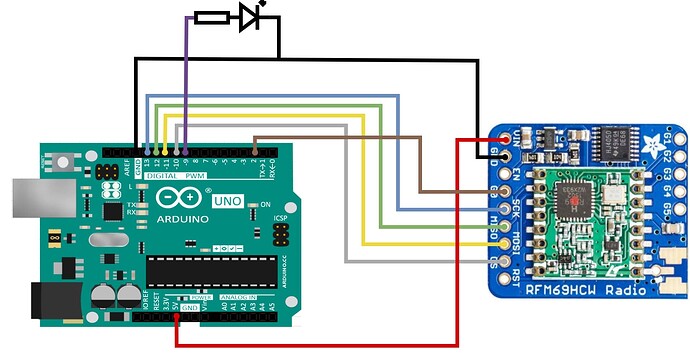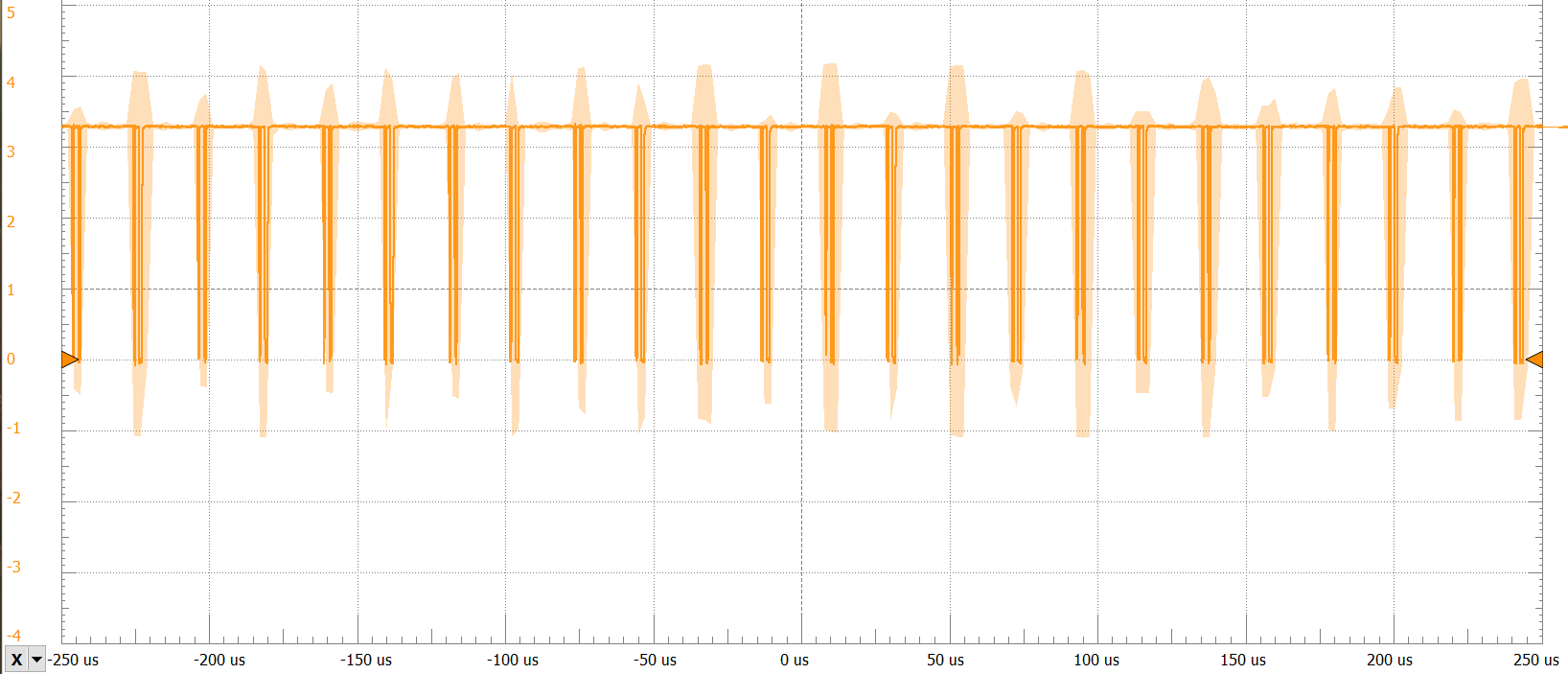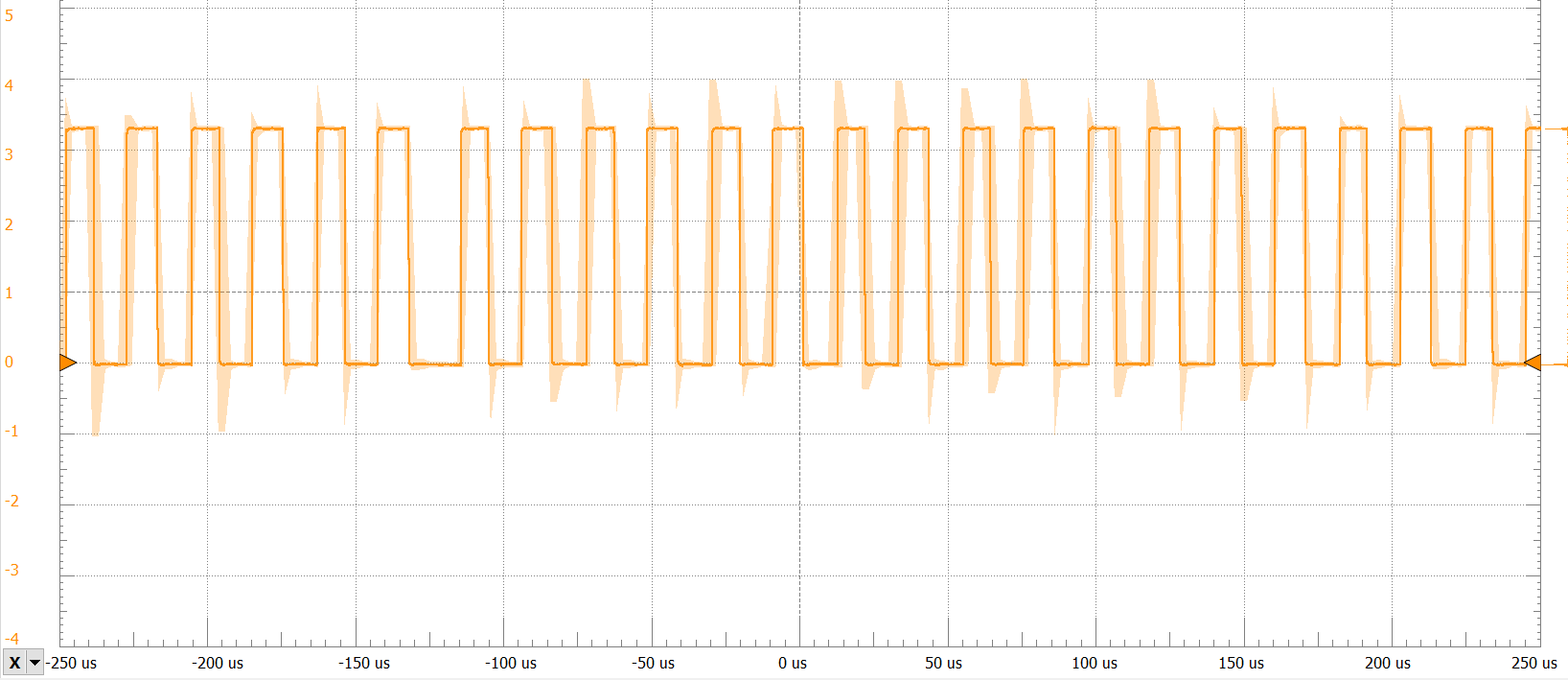Hello,
I am trying to use LowPowerLab's RFM69 library, but I can't get past the initialization. I have gotten RadioHead examples to work, so the problem shouldn't be soldering or the antenna.
I have an Adafruit RFM69HCW module connected to an Arduino Uno like so:
The Adafruit breakout board has logic level converters on all the pins, so they're connected directly to the Uno.
This is the code I'm running:
#include <RFM69.h> //get it here: https://www.github.com/lowpowerlab/rfm69
#include <RFM69_ATC.h> //get it here: https://github.com/lowpowerlab/RFM69
#include <SPI.h> //included with Arduino IDE (www.arduino.cc)
#include <LowPower.h> //get library from: https://github.com/lowpowerlab/lowpower
//****************************************************************************************************************
//**** IMPORTANT RADIO SETTINGS - YOU MUST CHANGE/CONFIGURE TO MATCH YOUR HARDWARE TRANSCEIVER CONFIGURATION! ****
//****************************************************************************************************************
#define NETWORKID 0 //the same on all nodes that talk to each other
#define RECEIVER 1 //unique ID of the gateway/receiver
#define SENDER 2
#define NODEID SENDER //change to "SENDER" if this is the sender node (the one with the button)
//Match frequency to the hardware version of the radio on your Moteino (uncomment one):
#define FREQUENCY RF69_433MHZ
#define ENCRYPTKEY "sampleEncryptKey" //exactly the same 16 characters/bytes on all nodes!
#define IS_RFM69HW_HCW //uncomment only for RFM69HW/HCW! Leave out if you have RFM69W/CW!
//*****************************************************************************************************************************
//#define ENABLE_ATC //comment out this line to disable AUTO TRANSMISSION CONTROL
#define ATC_RSSI -75
//*********************************************************************************************
#define SERIAL_BAUD 9600
#ifdef ENABLE_ATC
RFM69_ATC radio;
#else
RFM69 radio;
#endif
void setup() {
Serial.begin(SERIAL_BAUD);
if(!radio.initialize(FREQUENCY,NODEID,NETWORKID)){
Serial.println("init failed");
while(1);
}
Serial.println("radio successfully initiated");
}
I have changed the library's initialize() function like so:
bool RFM69::initialize(uint8_t freqBand, uint16_t nodeID, uint8_t networkID) {
_interruptNum = digitalPinToInterrupt(_interruptPin);
if (_interruptNum == (uint8_t)NOT_AN_INTERRUPT) return false;
#ifdef RF69_ATTACHINTERRUPT_TAKES_PIN_NUMBER
_interruptNum = _interruptPin;
#endif
const uint8_t CONFIG[][2] = {
/* 0x01 */ { REG_OPMODE, RF_OPMODE_SEQUENCER_ON | RF_OPMODE_LISTEN_OFF | RF_OPMODE_STANDBY },
/* 0x02 */ { REG_DATAMODUL, RF_DATAMODUL_DATAMODE_PACKET | RF_DATAMODUL_MODULATIONTYPE_FSK | RF_DATAMODUL_MODULATIONSHAPING_00 }, // no shaping
/* 0x03 */ { REG_BITRATEMSB, RF_BITRATEMSB_55555}, // default: 4.8 KBPS
/* 0x04 */ { REG_BITRATELSB, RF_BITRATELSB_55555},
/* 0x05 */ { REG_FDEVMSB, RF_FDEVMSB_50000}, // default: 5KHz, (FDEV + BitRate / 2 <= 500KHz)
/* 0x06 */ { REG_FDEVLSB, RF_FDEVLSB_50000},
/* 0x07 */ { REG_FRFMSB, (uint8_t) (freqBand==RF69_315MHZ ? RF_FRFMSB_315 : (freqBand==RF69_433MHZ ? RF_FRFMSB_433 : (freqBand==RF69_868MHZ ? RF_FRFMSB_868 : RF_FRFMSB_915))) },
/* 0x08 */ { REG_FRFMID, (uint8_t) (freqBand==RF69_315MHZ ? RF_FRFMID_315 : (freqBand==RF69_433MHZ ? RF_FRFMID_433 : (freqBand==RF69_868MHZ ? RF_FRFMID_868 : RF_FRFMID_915))) },
/* 0x09 */ { REG_FRFLSB, (uint8_t) (freqBand==RF69_315MHZ ? RF_FRFLSB_315 : (freqBand==RF69_433MHZ ? RF_FRFLSB_433 : (freqBand==RF69_868MHZ ? RF_FRFLSB_868 : RF_FRFLSB_915))) },
// looks like PA1 and PA2 are not implemented on RFM69W/CW, hence the max output power is 13dBm
// +17dBm and +20dBm are possible on RFM69HW
// +13dBm formula: Pout = -18 + OutputPower (with PA0 or PA1**)
// +17dBm formula: Pout = -14 + OutputPower (with PA1 and PA2)**
// +20dBm formula: Pout = -11 + OutputPower (with PA1 and PA2)** and high power PA settings (section 3.3.7 in datasheet)
///* 0x11 */ { REG_PALEVEL, RF_PALEVEL_PA0_ON | RF_PALEVEL_PA1_OFF | RF_PALEVEL_PA2_OFF | RF_PALEVEL_OUTPUTPOWER_11111},
///* 0x13 */ { REG_OCP, RF_OCP_ON | RF_OCP_TRIM_95 }, // over current protection (default is 95mA)
// RXBW defaults are { REG_RXBW, RF_RXBW_DCCFREQ_010 | RF_RXBW_MANT_24 | RF_RXBW_EXP_5} (RxBw: 10.4KHz)
/* 0x19 */ { REG_RXBW, RF_RXBW_DCCFREQ_010 | RF_RXBW_MANT_16 | RF_RXBW_EXP_2 }, // (BitRate < 2 * RxBw)
//for BR-19200: /* 0x19 */ { REG_RXBW, RF_RXBW_DCCFREQ_010 | RF_RXBW_MANT_24 | RF_RXBW_EXP_3 },
/* 0x25 */ { REG_DIOMAPPING1, RF_DIOMAPPING1_DIO0_01 }, // DIO0 is the only IRQ we're using
/* 0x26 */ { REG_DIOMAPPING2, RF_DIOMAPPING2_CLKOUT_OFF }, // DIO5 ClkOut disable for power saving
/* 0x28 */ { REG_IRQFLAGS2, RF_IRQFLAGS2_FIFOOVERRUN }, // writing to this bit ensures that the FIFO & status flags are reset
/* 0x29 */ { REG_RSSITHRESH, 220 }, // must be set to dBm = (-Sensitivity / 2), default is 0xE4 = 228 so -114dBm
///* 0x2D */ { REG_PREAMBLELSB, RF_PREAMBLESIZE_LSB_VALUE } // default 3 preamble bytes 0xAAAAAA
/* 0x2E */ { REG_SYNCCONFIG, RF_SYNC_ON | RF_SYNC_FIFOFILL_AUTO | RF_SYNC_SIZE_2 | RF_SYNC_TOL_0 },
/* 0x2F */ { REG_SYNCVALUE1, 0x2D }, // attempt to make this compatible with sync1 byte of RFM12B lib
/* 0x30 */ { REG_SYNCVALUE2, networkID }, // NETWORK ID
//* 0x31 */ { REG_SYNCVALUE3, 0xAA },
//* 0x31 */ { REG_SYNCVALUE4, 0xBB },
/* 0x37 */ { REG_PACKETCONFIG1, RF_PACKET1_FORMAT_VARIABLE | RF_PACKET1_DCFREE_OFF | RF_PACKET1_CRC_ON | RF_PACKET1_CRCAUTOCLEAR_ON | RF_PACKET1_ADRSFILTERING_OFF },
/* 0x38 */ { REG_PAYLOADLENGTH, 66 }, // in variable length mode: the max frame size, not used in TX
///* 0x39 */ { REG_NODEADRS, nodeID }, // turned off because we're not using address filtering
/* 0x3C */ { REG_FIFOTHRESH, RF_FIFOTHRESH_TXSTART_FIFONOTEMPTY | RF_FIFOTHRESH_VALUE }, // TX on FIFO not empty
/* 0x3D */ { REG_PACKETCONFIG2, RF_PACKET2_RXRESTARTDELAY_2BITS | RF_PACKET2_AUTORXRESTART_OFF | RF_PACKET2_AES_OFF }, // RXRESTARTDELAY must match transmitter PA ramp-down time (bitrate dependent)
//for BR-19200: /* 0x3D */ { REG_PACKETCONFIG2, RF_PACKET2_RXRESTARTDELAY_NONE | RF_PACKET2_AUTORXRESTART_ON | RF_PACKET2_AES_OFF }, // RXRESTARTDELAY must match transmitter PA ramp-down time (bitrate dependent)
/* 0x6F */ { REG_TESTDAGC, RF_DAGC_IMPROVED_LOWBETA0 }, // run DAGC continuously in RX mode for Fading Margin Improvement, recommended default for AfcLowBetaOn=0
{255, 0}
};
digitalWrite(_slaveSelectPin, HIGH);
pinMode(_slaveSelectPin, OUTPUT);
Serial.println(_slaveSelectPin);
//-------------------------------new------------------------------------------------
// borrowed from the Radiohead library's init function:
//get device type and check it
//test if we really are connected to a device
int deviceType = readReg(REG_VERSION);
if (deviceType == 00 || deviceType == 0xff){
Serial.println("device type not acceptable");
//return false;
}
//--------------------------------------------------------------------------------
if(_spi == nullptr){
_spi = &SPI;
}
_spi->begin();
#ifdef SPI_HAS_TRANSACTION
_settings = SPISettings(8000000, MSBFIRST, SPI_MODE0);
#endif
uint32_t start = millis();
uint8_t timeout = 50;
//--------- new ---------------------------------------------------------------------------
//keeping this while loop going so that I can debug the hw connections:
do writeReg(REG_SYNCVALUE1, 0xAA); while (readReg(REG_SYNCVALUE1) != 0xaa); //&& millis()-start < timeout);
//-----------------------------------------------------------------------------------------
if (millis()-start >= timeout) {
return false;
}
start = millis();
do writeReg(REG_SYNCVALUE1, 0x55); while (readReg(REG_SYNCVALUE1) != 0x55 && millis()-start < timeout);
if (millis()-start >= timeout) {
return false;
}
for (uint8_t i = 0; CONFIG[i][0] != 255; i++)
writeReg(CONFIG[i][0], CONFIG[i][1]);
// Encryption is persistent between resets and can trip you up during debugging.
// Disable it during initialization so we always start from a known state.
encrypt(0);
setHighPower(_isRFM69HW); // called regardless if it's a RFM69W or RFM69HW (at this point _isRFM69HW may not be explicitly set by constructor and setHighPower() may not have been called yet (ie called after initialize() call)
setMode(RF69_MODE_STANDBY);
start = millis();
while (((readReg(REG_IRQFLAGS1) & RF_IRQFLAGS1_MODEREADY) == 0x00) && millis()-start < timeout); // wait for ModeReady
if (millis()-start >= timeout){
return false;
}
attachInterrupt(_interruptNum, RFM69::isr0, RISING);
_address = nodeID;
#if defined(RF69_LISTENMODE_ENABLE)
selfPointer = this;
_freqBand = freqBand;
_networkID = networkID;
#endif
return true;
}
Now what happens is that reading the REG_VERSION register should have returned 42 had there been an SPI connection, according to the RadioHead library's init function. It returns 0.
I scoped the spi pins on the RFM69HCW and discovered that the MISO pin gave a very small signal:
compared to when I did the same using the RadioHead library:
The MOSI pin looked like this:
SCK:
NSS:
Any idea what could be the problem? Help would be very much appreciated ![]()





